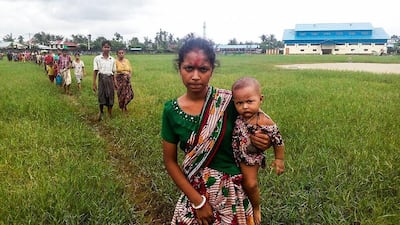The Muslim Rohingya people of Myanmar are often called the most persecuted minority in the world. The only trouble with this description is that it implies the Rohingya are a “minority” in the ordinarily recognised sense of the word: a numerically subordinate group of citizens of a state. This is a definition with which the government of Myanmar violently disagrees. To Myanmar’s rulers, the country’s 1.1 million Rohingya inhabitants are not people; they are a problem. Myanmar’s conduct for decades confirms that it doesn’t want to reconcile with the Rohingya, it seeks to eradicate them.
Over the weekend, tens of thousands of Rohingya – mainly women and children – fled their homes to escape the Myanmar army's fierce reprisals after Rohingya insurgents launched attacks on security services. Nearly a hundred people have already been killed. The Rohingya have for the most part been a peaceful people, but the unending persecution at the hands of the government of Myanmar and its Buddhist majority has pushed some in their midst to take up arms. Hundreds of Rohingya men, women and children in one of Rakhine's villages have for weeks been subjected to a total blockade by sword-wielding Buddhists; there are fears that people might die of starvation. And yet the authorities refuse to intervene.
Aung San Suu Kyi, who became Myanmar's head of government last year after 15 years of house arrest, undermines the Nobel Peace Prize awarded to her by refusing to break with the state's reprehensible policy towards the Rohingya. More than 400,000 Rohingya have sought refuge in Bangladesh since the 1990s; many others have gone to India, whose government, in a shameful repudiation of the country's avowed values, is preparing to expel them.
The final report of the Rakhine Advisory Committee, led by the former UN chief Kofi Annan, calls on the government of Myanmar to grant citizenship to the Rohingya. The Rohingya people's connection to Rakhine is older than Myanmar's history as an independent republic. The world's silence on their plight is a stain on humanity's conscience. The least it can do it press Naypyidaw to immediately halt the violence against the Rohingya and implement Mr Annan's recommendations.

